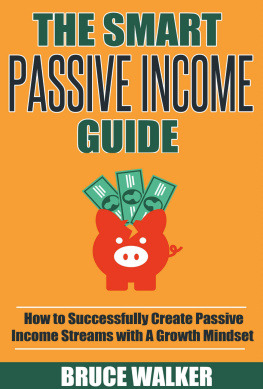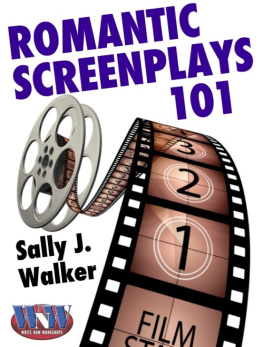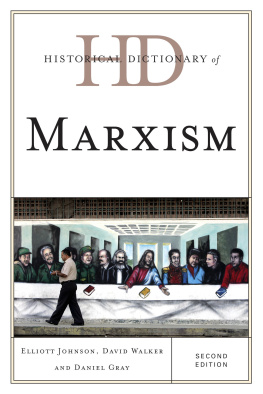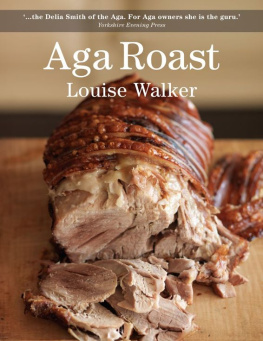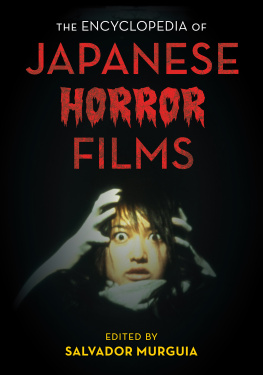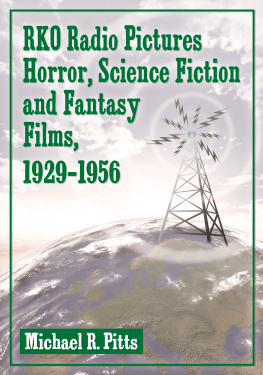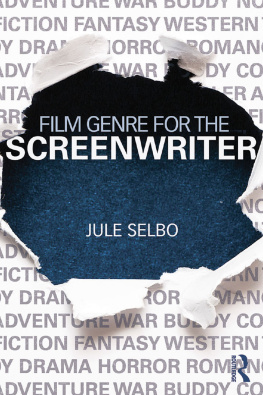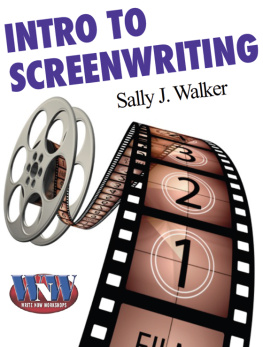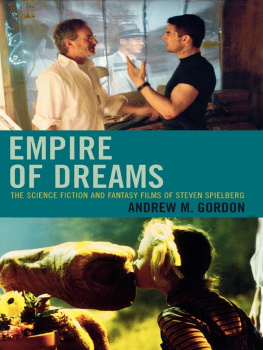Screenwriting Secrets
in Genre Film
by Sally J. Walker
Genre: Nonfiction
Book #1 in the Write Now Workshops series
Write Now Workshops logo by Tony McGowan
Kindle: 978-1-58124-9521
ePub: 978-1-58124-9538
2012 by Sally J. Walker
Published 2012 by The Fiction Works
http://www.fictionworks.com
All rights reserved. No part of this book may be reproduced without written permission, except for brief quotations to books and critical reviews.
Sally Walkers Screenwriting Secrets in Genre Film is a comprehensive, valuable resource that can benefit writers of many different levels. There are useful tips, strategies, examples, and recommendations throughout.
Stephanie Palmer, former MGM executive
and CEO of Good in a Room ( goodinaroom.com )
I wish that I had material like this for those hungry young minds who moved beyond screenwriting fundamentals in my previous years at UCLA. Sally has struck upon a very unique process of presenting both concepts and the essence of specific genres then actually pointing them out in exemplary films. She presents both the why and the how in a most insightful manner. The whole book motivates the writer who truly wants to create more than one script. There is not one course or book out there like this, including my own 434. Not only new writers, but the entire film industry needs this book.
Lew Hunter, Chair Emeritus-Professor at UCLAs
Film Department, Former NBC Program Director
Book #1
I dedicate this book to my screenwriting mentors: the late N.B. Stone, Jr. of Paramount Studios, Joe Wallenstein of USC and my beloved Lewis Ray Hunter of UCLA. May I continue their tradition of paying it forward and motivate others to do the same!
My deepest thanks go out to Ann Pullum aka Ann Stephens and Ray Hoy, my publisher, for the hours and eye strain, the catches and admonishments, the love that they invested in this book to get it as right as possible.
Foreword
I present to you material I have learned and skills I have developed in my own writing process over the past 25+ years. Herein are concepts I use, not just think about. As a writer first and a teacher second, I practice the philosophy of teaching practical concepts rather than abstract principles. Ever heard academics described as instructors who talk the talk, but cant walk the walk or Those who cant do, teach? You will not be able to say either about any of my Write Now Workshop materials, including what is here in Screenwriting Secrets in Genre Film.
Think about using the following principles every time you sit down to write a screenplay. Fundamentals never get outdated. They are what they are: essential to a writing process. You must pull from the following pages what works for you. Each of us should accept that we are not an all-knowing God thus are perpetually learning, growing, changing as we each identify what works and ignore what doesnt. Is that how you approach your learning?
You may be wondering how I evolved the concepts of this particular book. After teaching a number of Intro to Screenwriting classes, I had students who wanted more depth, more information to continue their learning process. I pulled notes from numerous articles and screenwriting books, as well as from my study of various genres for a fiction course. I discovered a correlation between certain genres and particular aspects of all genres that also applied to film. I simply and logically melded the two storytelling processes of fiction and cinematic storytelling to create this book. Finally, I worked to identify specific films that depict the key concepts I choose to explain. Some films are recent, some are old. They were not chosen as representative of the best of the best but because they demonstrate the concepts I have explained.
Throughout the entire book there are structure and character concepts I repeatedly point out in the various genres. My purpose is not to imply you dont get it, but rather to demonstrate the importance of fundamentals in all the kinds of stories.
My analysis of film examples are purely my opinion, based on my timing of the films and my own research.
Book Objectives
By the end of this book (and completion of the suggested Exercises) you will be able to:
1. Use the paradigm to analyze any story or film and plan your own screenplay.
2. Identify essential story elements, characterization, and plot types for each of eleven genres.
3. Demonstrate how elements of one genre can be mixed with another to improve your story.
4. Analyze any film on your own, identifying what works and what doesnt.
Other Book Recommendations
I suggest the following texts because I have pulled and tweaked material from many of them to formulate my own process. I present the list in the order I consider the most helpful to gradually enhance your craft knowledge.
INTRO TO SCREENWRITING, Sally J. Walker
(A succinct, fundamental walk-through of the basics)
THE IDIOTS GUIDE TO SCREENWRITING, Skip Press
(A fundamentals-type text with lots of insider questions answered)
THE WRITERS JOURNEY, Christopher Vogler (A storytelling construct applying Joseph Campbells concepts)
SCREENPLAY, FOUNDATIONS OF SCREENWRITING, Syd Field (Another fundamentals-type textbook)
THE SCREENWRITERS WORKBOOK, Syd Field (An applications-type textbook)
THE ART OF DRAMATIC WRITING, Lajos Egri
(A fundamentals concept book for stage & film writers)
THE 1-3-5 STORY STRUCTURE SYSTEM, Donna Michelle Anderson
(A little handbook written by a Studio Reader applying BASICS)
http://www.movieinabox.com/135/
Others (in progressively more complex-concept order):
SCREENWRITING 434, Lew Hunter
SAVE THE CAT, Blake Snyder
MAKING THE GOOD SCRIPT GREAT, Linda Seger (And any other Seger books...)
STEALING FIRE FROM THE GODS, James Bonnet
WRITING SCREENPLAYS THAT SELL, Michael Hauge
STORY, Robert McKee
THE ANATOMY OF STORY, John Truby
WRITING FOR EMOTIONAL IMPACT, Karl Iglesias
Throughout the chapters I will also suggest various other specific books that I have utilized in growing my various storytelling, characterization and writing skills.
Requirements & Rationale
Readers will need to use assigned criteria to analyze the following films (two for each genre) to completely understand the genres. Film is a visual medium you cannot understand without seeing it. If you choose not to view any of the films, that is your loss, your choice. Each film has relevance to other specific points in that chapters lesson. You will find an analysis of each film to guide you. Those are the authors opinions. Its okay if you disagree. That just means you are thinking through the material and fitting the concepts into your process.
Each film on this list serves a particular purpose. Each demonstrates the chapter material addressed before the analysis. If you choose not to watch a particular movie, not to look for those specified concepts, you are only short-changing yourself. You may even be compromising complete understanding of the material.
WITNESS (Mystery)
LETHAL WEAPON (Mystery)
STAR WARS IV (Science Fiction)
STAR TREK (Science Fiction)
LADYHAWKE (Fantasy)
HARRY POTTER (Fantasy)
MRS. DOUBTFIRE (Comedy)
National Lampoons CHRISTMAS VACATION (Comedy)
THE LION KING (Juvenile)
SHREK (Juvenile)
LAST BREATH (Horror)
THE GHOST & THE DARKNESS (Horror)
AVATAR (Romance)
Next page

